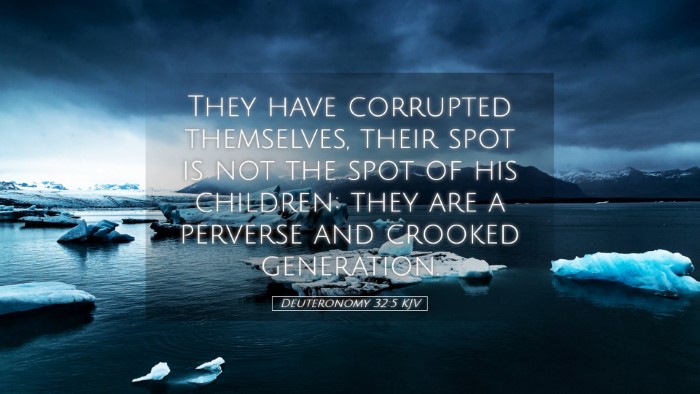Commentary on Deuteronomy 32:5
Verse: "They have corrupted themselves, their spot is not the spot of his children: they are a perverse and crooked generation." (Deuteronomy 32:5)
Introduction
The verse from Deuteronomy 32:5 appears in the context of Moses’ song, which serves to remind the Israelites of their covenantal obligations and the consequences of their unfaithfulness. This portion of scripture emphasizes the moral degeneration of the people and contrasts their condition with the holiness of God. In this commentary, we will explore insights from Matthew Henry, Albert Barnes, and Adam Clarke, making this analysis meaningful for pastors, students, theologians, and Bible scholars.
Corruption of Israel
Matthew Henry elucidates the gravity of Israel's corruption. He asserts that despite being chosen as God's people, they have turned aside and become corrupt in their actions and beliefs. This corruption implies a conscious departure from God's statutes and a heart inclined toward rebellion.
The term "corrupted" suggests a complete moral decline, indicating that their behavior is not merely flawed, but fundamentally tainted. Henry further encourages readers to understand that such corruption stems from disobedience and a lack of reverence for God, emphasizing the seriousness of straying from divine commandments.
Contrast with God's Children
Albert Barnes points out the phrase "their spot is not the spot of his children," highlighting a crucial theological assertion about identity and belonging. He interprets the "spot" as a metaphor for purity and holiness. God's children are marked by righteousness, while Israel has soiled that identity through sin. This contrast serves as a painful reminder of what could have been had they remained faithful.
Additionally, Barnes poignantly reflects on the consequences of this divergence, indicating that their actions not only affect their standing with God but also their legacy and witness to the nations around them. Being branded as 'corrupted' not only impacts their relationship with God but also their mission to represent Him to a watching world.
Perversion and Crookedness
Adam Clarke delves into the descriptive terms "perverse and crooked generation." He argues that these descriptors are intentional and reveal the nature of the people's hearts and behavior. The term "perverse" denotes a willful deviation from the straight path, while "crooked" suggests a lack of integrity and an inclination towards deceit.
In his commentary, Clarke emphasizes that this is a generational issue. It indicates not only the current condition of the people of Israel but also a systemic problem that could easily perpetuate itself. This observation raises a crucial point for contemporary readers: the sin and corruption of one generation can lead to the downfall of the next, underscoring the necessity for diligent teaching and correction within the community of faith.
Theological Implications
This verse, and the commentaries on it, hold significant theological implications. The nature of God's chosen people is intricately connected to their moral standing. The reminders from these commentaries urge us to recognize that corruption does not remain static; it leads to a destruction of identity and purpose.
Henry, Barnes, and Clarke collectively highlight the essential nature of adherence to God's commands as a prerequisite for remaining in covenant relationship with Him. This truth echoes throughout scripture and serves as an admonition to believers today to remain vigilant against moral and spiritual compromise.
Application for Today
For pastors and spiritual leaders, the insights from this verse offer a cautionary tale about the state of spiritual integrity within congregations. Drawing from Henry, Barnes, and Clarke, leaders are encouraged to foster a culture of holiness and accountability, teaching that the consequences of corruption extend far beyond individual sin, impacting entire communities.
Furthermore, for students and theologians, this passage invites deeper reflection on the nature of repentance and restoration. Engaging with the historical context and the implications of Israel's disobedience can yield valuable lessons about God's faithfulness, grace, and the potential for redemption even amidst pervasive sin.
Lastly, for scholars, the critical examination of terms like "corruption," "perverse," and "crooked" can lead to a broader understanding of biblical anthropology and the persistent need for moral reformation in both ancient and modern contexts. The exploration of this verse can challenge scholarly perspectives on the recurring themes of sin, divine judgment, and grace in the biblical narrative.
Conclusion
Deuteronomy 32:5 serves as a poignant reminder of the covenant relationship between God and His people, highlighting the grave implications of turning away from divine principles. Through the combined insights of esteemed commentators like Matthew Henry, Albert Barnes, and Adam Clarke, we gain a comprehensive understanding of Israel's moral plight and the theological principles that continue to resonate with believers today. The message of this verse encourages constant introspection and a commitment to nurturing righteousness within ourselves and our communities.


